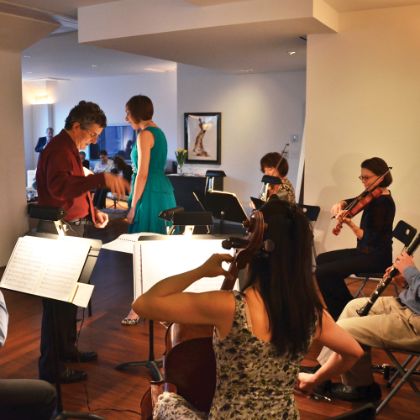Pianist András Schiff revisits The Well-Tempered Clavier and other totems of J.S. Bach — on stage and on record.
By Bradley Bambarger
“Great music is far greater than its performers. We try our entire lives to unveil its secrets and to convey its unique message. Even if we never quite reach the imaginary goal, our many performances give us experience and knowledge that were hidden from us years ago. We form a better understanding of its structure and inner workings. Horizons broaden before our eyes.”
Pianist András Schiff made this observation in an introduction to his 2007 live recording of J.S. Bach’s six Partitas, underscoring his reasons for recording this music a second time. Schiff, born in Budapest in 1953, first recorded the Partitas — and the other major Bach keyboard works — for Decca in the 1980s; the albums were considered milestones in the interpretation of Bach on the modern piano for their stylistic balance and purity of sound. Made as part of his subsequent, long-term relationship with ECM Records, Schiff’s 2007 recording of the Partitas followed the release of his second version of Bach’s Goldberg Variations, a concert recording made in October of 2001. Blending live energy with seasoned perspective, both remakes reflect the pianist’s humility before the music and his quest to be ever truer to it.
The twenty-first century has seen momentous projects from Schiff, not least of which was his live recording of all thirty-two of Beethoven’s piano sonatas. This fall he begins his major revisiting of Bach’s music, both on stage and on record. Schiff’s newest ECM release is a four-disc set of Bach’s Well-Tempered Clavier Books I and II. Long described as the Old Testament of the classical keyboard literature (with Beethoven’s piano sonatas as the New Testament), the forty-eight preludes and fugues of The Well-Tempered Clavier were a totemic, law-giving influence on Mozart, Beethoven, Chopin, Schumann, Brahms and virtually every composer since. Across some four hours, the two books balance the horizontal (melodic) with the vertical (harmonic) and the sacred with the secular; they contain sublime math and deep soul, bountiful joy and aching melancholy.
Schiff’s “Bach Project” included concerts across the U.S., beginning with The Well-Tempered Clavier and extending to the French Suites, English Suites, Partitas and Goldberg Variations (plus keyboard concertos with the San Francisco Symphony and New York Philharmonic). To herald the then new recording and the concerts, Schiff performed at Lincoln Center’s Kaplan Penthouse, setting the tone performing a Three-Part Invention in F minor of grave beauty. Why that piece? “Because I love it,” Schiff said. “And you can hear the essence of Bach in two minutes. Many composers talk too much. This music is a great example of how to say a lot in a very short span of time. There’s not one unnecessary note.
“It’s also a deeply spiritual piece,” Schiff added. “That’s one of the fascinating things to me about Bach — the sacred and the secular go hand in hand. This instrumental piece for keyboard could be in the middle of the St. Matthew Passion. And vice versa: in the B minor Mass, there are movements based on dances.”
Asked to speak to the universality of Bach, Schiff replied: “I know people who don’t like Shakespeare, don’t like Rembrandt, don’t like Bach — but it’s not something to be proud of.”
Schiff noted that despite its emotional and intellectual demands there remains plenty of joy and “sophisticated humor” in Bach’s music.
“Take the Quodlibet in the last variation of the ‘Goldbergs,’” said Schiff, “where he uses popular old German songs with naughty words. People of the time would’ve known what the words to those melodies were. Today, we don’t. So we just think that when we hear the ‘Goldbergs,’ we’re listening to something holy — which it is, in parts. But then here comes” — and he steps to the piano to play the jaunty Quodlibet tune and sings along with the folk-song lyrics — “‘cabbages and turnips have driven me away.’ It’s not exactly sacred, is it? From things like this comes the humor in Haydn, the humor in Beethoven. Humor is important. But you have to know how to tell a joke. If you play the Quodlibet like this” — he plays the tune in a po-faced manner — “it’s not very funny. It’s also wrong. If you know its folk-song background, you would know to never play the music this way. It’s not a matter of taste. There are things in interpretation that are matters of personal taste, and there are others that are not.”
When the discussion shifted to the question of the most authentic instrument for performing Bach’s keyboard music today, Schiff pointed out that while the two-manual harpsichord is ideally suited to works Bach wrote expressly for it, such as the Italian Concerto, the harpsichord can’t compete with the modern piano’s ability to reproduce the loud–soft dynamic of vocal-like appoggiaturas in The Well-Tempered Clavier. Book I is a collection of various preludes and fugues Bach had written in the years preceding its publication, and Schiff conceded that the composer must have had the organ originally in mind for the A minor Fugue of Book I because it demands an ending pedal note that a pianist can’t produce without turning to the sustaining pedal. “This A minor Fugue is the only example in all of Bach where I must use the pedal,” he said. “The pedal can do damage in Bach, destroying the voice leading, clarity of the counterpoint. Clarity is essential in this music. In Beethoven, it is different. He was the first to use the sustaining pedal creatively, in the beginning of the last movement of the ‘Waldstein’ Sonata. But he wanted the blurred effect.”
C minor fugue from The Well-Tempered Clavier, Book I
On the issue of legato versus staccato in Bach, Schiff admitted that he had once been “rather ignorant and critical” about the period-performance movement in early music. “But now I know there is a lot to learn from it. For example: varied articulation. If there is a phrase of, say, four sixteenth notes, you can play them all legato or all staccato or two one way and two the other, or whatever combination. Bach seldom gives you an indication of which. You have to use your imagination and your knowledge of style, and there are many possibilities.” He then played a phrase of Bach in the watery, nineteenth-century all-legato style, and commented, “It’s nonsense.” He then played it clipped in the all-staccato manner of the 1920s New Objectivity: “Another kind of nonsense, and very ugly.” Finally, he varied the articulation with a mix of legato and staccato, and the music suddenly made perfect expressive sense.
Markings for tempo are scarce in The Well-Tempered Clavier, but there are rare indications for the final prelude and fugue of Book I, in B minor — not that this tells a pianist exactly what to do. “The fugue is marked ‘Largo,’ so this is slow, indeed,” Schiff said. “And it is so chromatic, by the way, with all twelve tones in the first two statements — it’s unbelievably modern music. But, yes, here is a rare tempo marking in Bach. Yet adagio in Bach is different from adagio in Bruckner. This is why it’s important to know the instruments of the time and what they were capable of. The same goes for Beethoven, for Schubert. If you’ve ever played a fortepiano from Schubert’s time, you’ll know what the speed limits are, what is a slowness that is just not possible. The sound just dies. These things give us parameters for our interpretive choices.”
Asked about his exemplars in Bach on the piano, Schiff offered the Swiss pianist Edwin Fischer, who made the first complete recording of The Well-Tempered Clavier, in the 1930s for EMI. “I adore Edwin Fischer, and he has inspired me enormously. The older I get, the closer I feel to him. Despite my admiration for Glenn Gould and his mastery of counterpoint, I get further and further away from him. The vocal ideal in Bach, which is so important and comes from his cantatas, is very present in Fischer’s playing, as is the spiritual sense. In the pieces of The Well-Tempered Clavier that have this Lutheran chorale, cantata-like quality, often in a minor key, Fischer is absolutely right. Gould, however, makes a parody of these pieces. This I cannot forgive. Yes, music is subjective, but as I said before, it’s not totally subjective.”
Then there was the question about what Schiff heard in his earlier Bach recordings that he could improve upon. “There were touches of sentimentality that I didn’t consider sentimental at the time — and I don’t like sentimentality,” he said. “Perhaps you become more secure with age — you don’t feel a need to be ‘interesting.’ Even what’s interesting to you changes. When I was young, I thought Switzerland was a very boring country. Now I find it highly interesting. Maturity can mean you don’t always need to be entertained. Likewise, it can be an advantage of age that you don’t feel the need to impress or entertain anyone else. You know that this is a great piece of music that can speak for itself. All you have to do is not ruin it, and that’s already a lot to achieve.”

Photos: Lebrecht Music & Arts, Julien Jourdes
-

From Christemasse to Carole
The birth of Christmas in medieval England
Read More
By David Vernier -

The Next (Not-So-)Big Thing
New chamber orchestras are popping up all over America.
Read More
By Colin Eatock -

A Father's Lament
Finding solace in the sound of authentic sorrow
Read More
By Rev. Jake Bohstedt Morrill